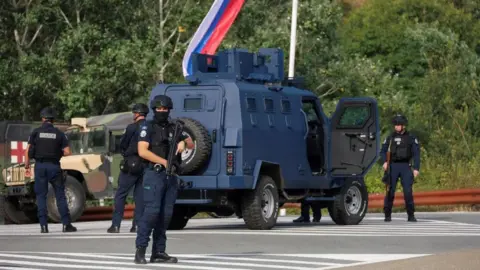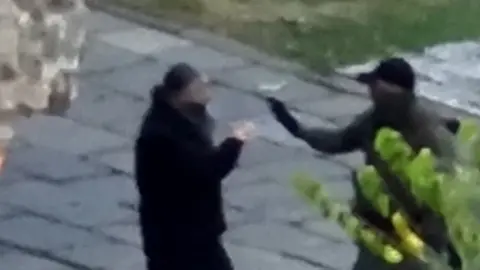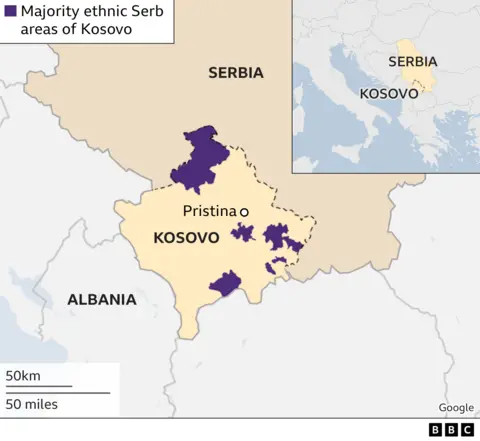Kosovo and Serbia row over monastery gun battle
 Reuters
ReutersKosovo and Serbia have traded accusations over a deadly stand-off between ethnic Serb gunmen and police in northern Kosovo.
One policeman and three of the gunmen were killed during a siege of a Serbian Orthodox monastery in Banjska village on Sunday.
Kosovo's PM Albin Kurti accused Serbia of supporting the armed group.
Serbian President Aleksandar Vucic said Kosovo officials bore ultimate responsibility for the deaths.
He said the three gunmen killed were Kosovo Serbs.
Sunday's clash marks one of the gravest escalations in Kosovo for years, and follows months of mounting tension between the two sides.
Kosovo declared independence in 2008 but Serbia - along with Belgrade's key allies China and Russia - does not recognise it.
Many Serbs consider it the birthplace of their nation. But of the 1.8 million people living in Kosovo, 92% are ethnic Albanians and only 6% are ethnic Serbs.
 Kosovo Government/Handout via Reuters
Kosovo Government/Handout via ReutersThe shooting began at about 03:00 local time (01:00 GMT), after Kosovan police said they arrived in Banjska, where about 30 heavily armed gunmen had earlier barricaded themselves in the monastery near the Serbian border.
Three of the gunmen were killed in battles through the day as police mounted what Kosovo's interior minister Xhelal Svecla described as a "clearance operation".
"We put this territory under control. It was done after several consecutive battles," he said.
The local authorities said six people were arrested, and a significant number of weapons was seized. The authorities did not say whether those detained took part in the attack.
Meanwhile, the Serbian Orthodox Church said the gunmen had left the monastery by night, Reuters news agency reported.
The Kosovan police officer was killed before the occupation of the monastery.
Kosovo's Prime Minister Albin Kurti blamed "Serbia-sponsored criminals" for the incursion, saying they were "professionals, with military and police background" who were financed and motivated by Belgrade.
Serbia's President Vucic hit back, blaming Mr Kurti for months of "provocations".
While describing the death of the Kosovo police officer as "absolutely reprehensible", he said Mr Kurti bore responsibility for the incident. "His only wish is to drag us into a war with Nato and that's the only thing he does all day".
Mr Vucic said there would have been fewer victims had Nato-led KFOR peacekeepers intervened.
There are currently about 4,500 peacekeepers in Kosovo.
The EU's foreign policy chief, Josep Borrell, condemned what he called the "hideous attack", saying those responsible must be brought to justice.
Tensions have run high in Kosovo, after violent clashes followed disputed local elections in May
Kosovo Albanian mayors were installed in majority-ethnic Serb areas, after local residents boycotted the polls.
Mr Borrell blamed Mr Kurti for failing to set up the association of Serb-majority municipalities which would give them more autonomy.
Nato deployed an additional 700 troops to Kosovo to deal with unrest in the northern town Zvecan following the elections.
Some 30 Nato peacekeepers and more than 50 Serb protesters were hurt in the ensuing clashes.

